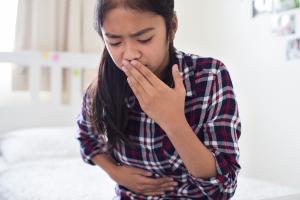If one consumes food or drinking water which comes in touch with bacteria and insects, it may cause gastroenteritis. Consumption of such food and water contaminated with bacteria, toxins, and parasites can lead to gastroenteritis.

Representational picture
It's the time of the year you wake up to the sound of rain and crave some warm, rich food. But with the cool relaxing monsoon comes a bevy of ailments and infections, making it a season to stay double cautious about your diet. During rains, the first priority should be to boost immunity and save your body from possible infections.
If one consumes food or drinking water which comes in touch with bacteria and insects, it may cause gastroenteritis. Consumption of such food and water contaminated with bacteria, toxins, and parasites can lead to gastroenteritis.
Gastroenteritis is an infection of the bowel and is sometimes called a tummy bug, or food poisoning. With gastroenteritis, the main symptoms are watery diarrhea and vomiting. One might also have stomach pain, cramping, fever, nausea and a headache. Because of diarrhea and vomiting, one can be dehydrated. Signs of dehydration are dry skin and a dry mouth, feeling lightheaded and being really thirsty.
There are many ways gastroenteritis can be spread such as contact with someone who has the virus, contaminated food or water, unwashed hands after going to the bathroom or changing a diaper and much more.
Food and waterborne illness often referred to as food poisoning, is generally caused by eating or drinking food or beverages contaminated by bacteria, parasites or viruses. These organisms are passed in the feces of animals and infected people. Symptoms of food or waterborne illness are gastrointestinal, for example, diarrhea and stomach cramps. You can also get sick from swimming in contaminated water or from close contact with someone else who is ill.
Dr. Roy Patankar, Director & Gastroenterologist at ZEN Hospital lists some tips to keep you healthy:
- Always make sure you wash your hands well after using the bathroom. This is very important if you use a common bathroom, either at work or any other place.
- Wash your hands well and regularly especially before eating or cooking any food.
- Keep your surroundings clean. Sterilize surfaces like, table tops, door handles etc. with bleach based cleaner.
- Always drink water which is properly boiled .
- Avoid eating food prepared at roadside stalls or places which are unhygienic.
- Avoid eating undercooked or raw fish.
- Avoid fruits which are pre-cut and available on street. Have fresh fruits which are washed, peeled and cut by you.
- If you get drenched in the rain and walk in puddles of water, wash your hands and feet well as soon as you get the chance, without touching anything else to minimise the transmission of the organisms through inanimate objects.
- Remove your shoes outside your house to avoid carrying bacteria from puddles into your home.
- Before using your computer or laptop clean your keyboard and mouse well as they are common agents that can spread the bacterium.
- Excessive stress has been known to lower one's immunity, making you more prone to contracting diseases so try to lower your stress levels.
Catch up on all the latest Crime, National, International and Hatke news here. Also download the new mid-day Android and iOS apps to get latest updates
 Subscribe today by clicking the link and stay updated with the latest news!" Click here!
Subscribe today by clicking the link and stay updated with the latest news!" Click here!







